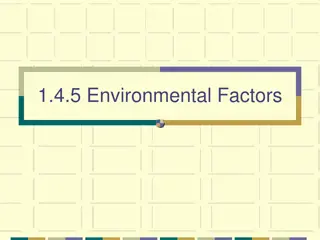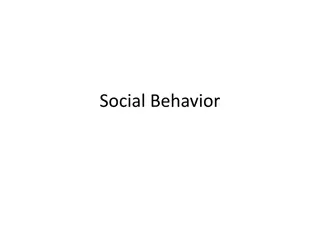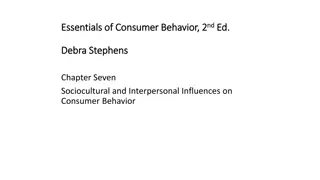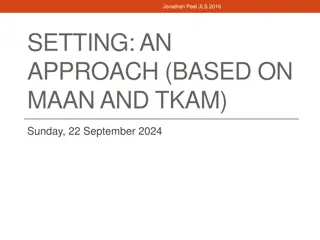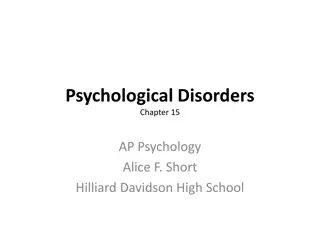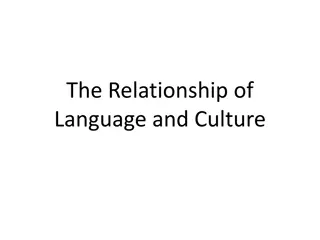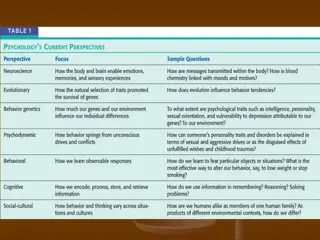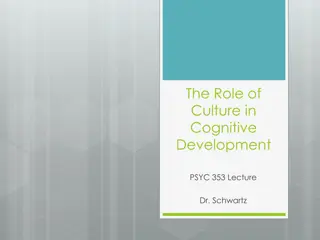Business Environment
The importance of internal and external factors in influencing business decisions. It covers the challenges presented by the business environment, the process of environmental analysis, and the tools used to monitor and evaluate the environment. The article also explores the significance of internal
10 views • 29 slides
Is Your Mobile App Prepared Understanding Store Rejection Factors
To avoid this pitfall, it\u2019s crucial to understand the potential rejection factors and ensure your app is polished and compliant before submission. As a leading best mobile app development services in Arizona, we at Net-Craft.com believe in transparency and preparation. In this article, we\u2019
1 views • 3 slides
Enhancing Scientific Literacy in Early Years Play-Based Learning
This PhD research proposal explores scientific literacy among children in play-based learning, focusing on everyday concepts and their application to scientific understanding. The study aims to implement Vygotsky's sociocultural theory to enhance children's scientific literacy through Vision 1 and V
7 views • 19 slides
MARKETING ENVIRONMENT
The marketing environment comprises external factors impacting an organization's relationship with customers. It includes macro-environment (legal, technological, sociocultural), micro-environment (demographic, economic, natural, technological, political, cultural forces), and internal environment.
2 views • 48 slides
Understanding Migration: Factors and Impacts
Explore the complexities of migration through push and pull factors, including forced and voluntary migration. Understand how political, economic, social, and environmental factors influence people's decision to move. Reflect on your own family's migration factors.
7 views • 19 slides
The Main Factors That Influence the Consumer Buyer Behavior
Consumer buyer behavior is influenced by various factors such as cultural, social, personal, and psychological elements. Culture, social factors like family and opinion leaders, personal factors such as age, occupation, lifestyle, and personality, as well as psychological factors like motivation, pl
2 views • 8 slides
Analysis of Individual Risk Factors in Ventral Hernia Repair Outcomes
This study explores the impact of various risk factors on predicting adverse outcomes of ventral hernia repair using data from the Abdominal Core Health Quality Collaborative (ACHQC). The research aims to quantify and compare the influence of different factors, hypothesizing that hernia- and procedu
0 views • 14 slides
Understanding Systemic Functional Linguistics in Contemporary Language Studies
Explore the role of language in everyday life, the principles of Systemic Functional Linguistics, and the application of discourse analysis in translation. Delve into the Hallidayan model of language and discourse, examining genre, register, sociocultural environment, and more.
0 views • 20 slides
Understanding Theories of Gender and Behavior
Explore traditional gender characteristics, past biological and sociocultural factors, current biological and societal influences, and individual traits that shape gender-related behavior. Discover how group-level factors and societal-environmental influences play a role in defining gender roles and
4 views • 40 slides
Understanding Environmental Factors in Terrestrial and Aquatic Environments
Environmental factors play a crucial role in shaping ecosystems. In both terrestrial (land) and aquatic (water) environments, organisms are influenced by abiotic factors such as temperature, light intensity, and pH, as well as biotic factors like plants, predators, and competitors. Understanding the
4 views • 19 slides
Factors Affecting Microbial Growth in Food: Intrinsic and Extrinsic Factors
In food, microbial growth is influenced by intrinsic factors like pH, water activity, nutrient content, and extrinsic factors such as environmental conditions. The pH level, moisture content, and water activity play crucial roles in determining the growth of microorganisms, with specific ranges affe
0 views • 23 slides
Factors Influencing Customer Choice: Psychological, Sociocultural, Economic, and Government Factors
Psychological factors, such as perception and lifestyle, play a key role in customer choice. Sociocultural influences from society and culture also impact decisions, while economic factors like income levels and government policies can sway customer preferences. Understanding these factors is crucia
0 views • 18 slides
Framework for Building National Forest Monitoring Systems for REDD+
This module outlines a comprehensive framework for developing national forest monitoring systems for REDD+ initiatives. It covers key components such as satellite land monitoring, national forest inventories, greenhouse gas reporting, emission factors, and integrated monitoring systems focusing on c
0 views • 14 slides
Comprehensive Guide to Factorization in Mathematics
Explore the concept of factorization in algebraic expressions, including the definition of factors, common factors, methods of factorization, and illustrated examples. Learn about finding factors, common factors, and various factorization techniques such as common factors method and regrouping of te
0 views • 13 slides
Overview of Life-span Development and Contemporary Concerns
This content introduces the concept of life-span development, highlighting the life-span perspective, human life span versus life expectancy, and characteristics of this developmental approach. It touches on contemporary concerns such as health, well-being, parenting, education, sociocultural contex
5 views • 50 slides
Understanding Sociocultural Context in Social Behavior
Human behavior is inherently cultural due to our social nature, shaping our interactions through shared meanings and institutions. Social behaviors vary across cultures, influenced by cultural transmission. Indigenous social psychologies cater to specific societies, emphasizing the importance of rol
3 views • 58 slides
Developing Communicative Competence in English Language Teaching
In English language teaching, the main goal of a communicative classroom is to foster students' communicative competence. This includes grammatical competency, sociocultural competency, discourse competency, and strategic competency. By focusing on these aspects, educators aim to enhance students' a
0 views • 7 slides
Diversity & Inclusion Grant Report: Podcast Assignment Review 2019-2020
This report discusses the Diversity & Inclusion Grant report for the Diversity Podcast Assignment completed by HSS students under Dr. Vanessa Drew-Branch. The assignment included pre/post-tests, podcast groups connected to service-learning sites, and focused on sociocultural knowledge and systemic f
0 views • 10 slides
Sociocultural Dynamics of Food (In)security Among Farm Households in Oyo State, Nigeria
This doctoral dissertation seminar explores the sociocultural dynamics of food security among farm households in Oyo State, Nigeria. It delves into demographic characteristics, food production and consumption patterns, socio-cultural drivers of behaviors, and factors influencing food security. The s
0 views • 33 slides
Progress through the PhD Program: Year-by-Year Guide
Navigate your PhD journey with this comprehensive year-by-year progress guide designed by Laura Ogden, Graduate Program Director of Global & Sociocultural Studies. From choosing classes to conducting research and dissertation work, stay on track by following the outlined goals for each year. Ensure
0 views • 11 slides
Prevalence and Factors of Eating Disorders Among High School Students
Eating disorders pose serious risks to individuals, influenced by various factors such as genetics, trauma, and sociocultural ideals. The disorders, including anorexia nervosa and bulimia nervosa, have high mortality rates and often coexist with other mental conditions. Recognizing signs like body i
1 views • 28 slides
Sociocultural and Interpersonal Influences on Consumer Behavior
Explore how cultures, social identities, friends, family, and reference groups affect consumer behavior. Learn about the impact of interpersonal relationships on product sharing and brand experiences. Understand the significance of cultural influences, reference groups, and how they shape consumer d
0 views • 6 slides
Understanding Active Learning in Education
Active learning engages students in the learning process through meaningful activities and requires them to think about what they are doing. It is not a one-size-fits-all approach and can vary based on various factors. Theoretical underpinnings, such as Constructivist Learning Theory and Sociocultur
0 views • 9 slides
Introduction to Psychology: Understanding Behavior and Mental Processes
This material covers key aspects of psychology including the definition of psychology, its scientific nature, comparison with fake sciences, the birth of modern psychology, and different perspectives in psychology such as learning, biological, cognitive, and sociocultural. It delves into the roots o
0 views • 42 slides
Ecological Factors and Climatic Influences on Plant Life
Ecological factors play a crucial role in shaping the environment for organisms to thrive. This includes living (biotic) and non-living (abiotic) components like climatic factors, edaphic factors, topographic factors, and biotic factors. Climatic factors such as light, temperature, water, wind, and
0 views • 14 slides
Exploring Setting in Literature: An In-Depth Analysis of Character and Theme Relationships
Delve into the significance of setting in literary works like "To Kill a Mockingbird" and "Much Ado About Nothing", uncovering its impact on character development and thematic elements. Discover how precise locations, historical eras, and sociocultural contexts create a rich tapestry that shapes the
0 views • 12 slides
Understanding Psychological Disorders: Theoretical Approaches and Abnormal Behavior
Explore the realm of psychological disorders through theoretical approaches such as the Biological, Psychological, and Sociocultural models. Delve into the complexities of abnormal behavior, including definitions and examples. Gain insights into the impact of biological, psychological, and sociocult
0 views • 47 slides
The Intricate Relationship Between Language and Culture
Language serves as a vital tool for social interaction, intricately woven into the fabric of culture. It expresses, embodies, and symbolizes cultural realities. In the interplay of nature and culture, language immortalizes and transforms elements like roses, embodying essential aspects of society. T
0 views • 9 slides
Understanding the 7 Approaches in Psychology: Applied in the Case of Andrea Yates
Explore how the 7 psychological approaches - psychological, cognitive, behavioral, humanistic, biological, sociocultural, and evolutionary - can help analyze the complex case of Andrea Yates, who tragically murdered her children, delving into factors like postpartum depression, brain chemistry, fami
0 views • 12 slides
Exploring Authenticity through Tattooing: A Sociocultural Perspective
Delve into the intricate relationship between authenticity and tattooing as a means of self-representation. This discourse examines how individuals navigate their sense of self amid societal expectations, with tattoos serving as visible expressions of personal identity and authenticity. Through insi
0 views • 21 slides
Understanding Factors and Prime Factors in Mathematics
Explore the concept of factors and prime factors through practical scenarios involving Jedward, stationary supplies, and school choirs. Learn how to find factors of numbers like 18 and 30, identify prime numbers, write numbers as products of prime factors, determine common factors, and calculate low
0 views • 19 slides
Understanding Mesopic Factors in Roadway Calculations
Exploring the incorporation of mesopic factors into roadway calculations and how different design luminance ranges and Scotopic/Photopic (S/P) ratios interact with various calculation methods. The discussion includes factors as defined in TM-12 and proposed for RP-8, along with IES RP-8's Mesopic Fa
0 views • 37 slides
Factors Influencing Gestation Length in Various Animals
This comprehensive guide explores the factors affecting gestation length in different animals, including cattle, mares, sheep, goats, camels, buffaloes, dogs, and cats. It covers factors that prolong gestation, such as genetic factors, deficiencies in minerals and vitamins, anomalies in the fetus, a
0 views • 18 slides
Exploring the Intersection of Social Sciences and Mental Health
Delve into the dynamic relationship between social sciences and mental health, examining the sociocultural influences on mental illness through various theoretical perspectives. Explore methodologies in sociology and anthropology that analyze interpersonal relationships, power dynamics, and cultural
0 views • 35 slides
Sociocultural Factors Influencing Self-Concept and Identity Formation
Explore the impact of sociocultural factors on self-esteem, economic background, gender, and race in shaping one's sense of self. Delve into the concepts of Individualism and Collectivism, analyzing how different parts of the world prioritize these values. Reflect on the importance of teaching child
0 views • 38 slides
Cross-National & Cross-Cultural Risk Factors for Offending
Explore key risk factors for offending across nations & cultures, analyzing homicide rates, structural differences, individual/family factors, and the generalizability of crime risk factors. Learn about findings related to impulsivity, achievement, conduct problems, family supervision, parenting sty
0 views • 13 slides
Mechanisms Underlying Language Acquisition and Group Belonging
Will Forsyth's review explores how in-group affiliation behaviors facilitate speech acquisition through sociocultural, social-psychological, and social cognition approaches. Neural adaptations in Homo sapiens since Australopithecus, particularly in speech-related areas, are crucial for language evol
0 views • 8 slides
Factors Influencing Voting Behavior: A Comprehensive Analysis
This essay evaluates various factors influencing voting behavior, including media, social class, age, gender, geography, ethnicity, party leader image, issues, rational choice, party affiliation, tactical voting, dealignment, third-party choices, and non-voting. It discusses the relative importance
0 views • 12 slides
Sociology in Physiotherapy: Understanding Sociocultural Influences
Sociology plays a crucial role in physiotherapy as it helps professionals understand the societal and cultural factors that influence individuals. Through the study of social relationships and behaviors, physiotherapists can better address their clients' needs and provide tailored care. The applicat
0 views • 12 slides
Influence of Culture on Cognitive Development
Development, learning, and thinking are shaped by our social and cultural environment. Dr. Schwartz highlights the sociocultural perspective in understanding how we develop cognitively.
0 views • 42 slides









